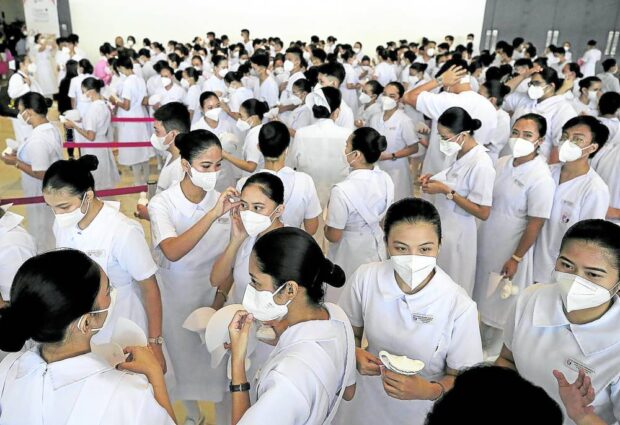
Nursing students wait for the capping and pinning ceremony. (INQUIRER FILE PHOTO)
MANILA, Philippines — The Philippine Nurses Association (PNA) has reiterated its opposition to the government’s hiring of clinical care associates (CCAs) in health facilities to solve the lack of health workers nationwide.
“We [have] vehemently opposed this since it was first mentioned last year. We do not agree that we should have this kind of pathway in the Philippines because we do not have legislation to support this kind of practice environment for ‘underboards’ [that will allow them to] actually work in the clinical setting,” Elmer Bondoc, PNA national president, said in an interview on dzBB on Thursday.
As “underboards,” CCAs have yet to pass the nursing board examination, making them ineligible to practice their profession in the country. During a meeting last week with President Ferdinand Marcos Jr., the Private Sector Advisory Council-Health Sector Group (PSAC-HSG) announced that around 300 CCAs had been hired in various hospitals nationwide as part of the government’s strategy to address the shortage problem.
To help the CCAs become licensed nurses, PSAC-HSG lead Paolo Borromeo, president and CEO of Ayala Healthcare Holdings Inc., told the President that the Commission on Higher Education (CHEd) had allocated P20 million for the nursing board review of 1,000 CCAs this year.
In July last year, the Department of Health partnered with CHEd to pave the way for the entry of CCAs into the healthcare system, in addition to a nursing review program to help them become licensed professionals.
READ: DOH urges Filipino nurses work in PH: ‘Our country needs you’
READ: Symptoms persist: Nurses leaving, docs still so few
READ: CHED, DOH ready plans for ‘underboard nurses’
‘Genuine’ investment
Bondoc called the CCA program a “band-aid solution” to the problem faced by the health sector. The PNA has been vocal in urging the administration “to make a genuine and substantial investment in the nursing sector.”
“This is not addressing the root causes of the nursing shortage in the country. We have many licensed nurses, but only a few are working in primary healthcare facilities because the government is not providing attractive opportunities [for] them to return to the profession, and the current system does not have [a] retentive capacity to make nurses stay in the country,” he said.
According to Bondoc, around 500,000 nurses renewed their Professional Regulation Commission licenses this year—more than enough to fill the estimated shortage of 106,000 nurses nationwide.